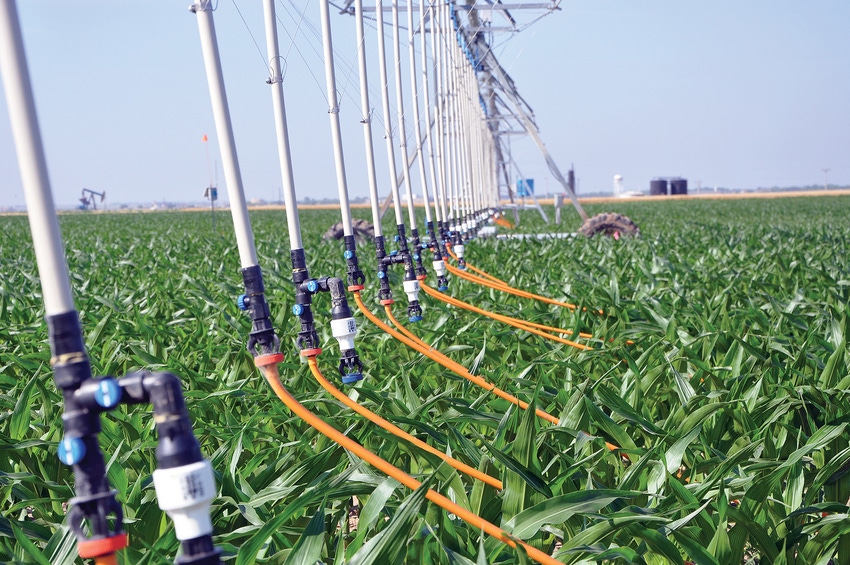Outcomes from collaborative effort to help producers grow more food with smart water management and strengthen resilience of food supply.

The Foundation for Food & Agriculture Research (FFAR) announced April 27 that it awarded a $5 million grant to launch the Irrigation Innovation Consortium, a collaborative research effort to accelerate the development and adoption of water- and energy-efficient irrigation technologies and practices through public/private partnerships.
The $5 million FFAR grant was matched by participants, bringing the total initial investment to $10 million to support research and collaboration costs over five years. The consortium is composed of the following initial founding members: California State University-Fresno, Colorado State University, Daugherty Water for Food Global Institute at the University of Nebraska (DWFI), Irrigation Assn. (IA), Jain Irrigation, Kansas State Research & Extension at Kansas State University, Lindsay Corp., Northern Water, Rubicon Water and Texas A&M AgriLife Research.
Public-sector researchers and industry partners will co-develop, test, prototype and improve innovations, equipment, technology and decision and information systems designed to equip “farms of the future” with cutting-edge technologies and optimization strategies to enhance irrigation efficiency. Initial research priorities include water and energy efficiency, remote sensing and big data applications for improving water management, irrigation technology acceleration and technology transfer. University scientists will collaborate with the U.S. Department of Agriculture Agricultural Research Service (ARS) on some components of the research.
“The new Irrigation Innovation Consortium unites top university research talent with industry to promote practical advancements in irrigation technology and water management practices,” FFAR executive director Dr. Sally Rockey said. “We are optimistic that outcomes from this collaborative effort will help producers grow more food with smart water management and strengthen the resilience of our food supply.”
Initial participants are working to create a platform for other universities, federal agencies -- including ARS -- and the private sector to work together on the critical water challenges facing agriculture, municipalities and industry. The goal is to create an internationally recognized, self-sustaining center of excellence that promotes and enhances water and energy efficiency in irrigation, ultimately creating greater resiliency in food and irrigated landscape systems.
Dan Devlin, director of the Kansas Center for Agricultural Resources & the Environment, noted that the grant will create possibilities for Kansas State researchers to work closely with industry members to help get their research innovations into the field even faster.
“The IA thanks FFAR and the university partners for their leadership in the creation of the new Irrigation Innovation Consortium,” said IA chief executive officer Deborah M. Hamlin. “We are confident that the research stemming from this collaborative effort will drive new advancements in efficient irrigation and keep the irrigation industry at the forefront of innovation.”
Specific research priorities will be determined by an executive committee, with representation from FFAR and academic and industry consortium participants. Irrigation industry involvement will help accelerate research and development for rapid application in the field.
Knowledge gained will be shared publicly through publications, workshops and seminars and appropriate data-sharing mechanisms.
As a collaborating partner, Texas AgriLife Research will help provide research to accelerate the development and adoption of water and energy-efficient irrigation technologies and practices.
“We will need to transition to a sustainable funding model fueled by marketable irrigation technologies and return on investment to our industry partners,” said Dr. Brent Auvermann, AgriLife Research center director at Amarillo, Texas.
Auvermann said AgriLife Research will distribute about $675,000 of the grant across the state with about a dozen faculty members participating. Remote-sensing using drones and satellite information, systems integration and management and use of big data or Internet of Things will be the primary areas of focus for AgriLife Research participants.
“We will be accelerating the development and adoption of new controls and precision application systems,” said Dr. Bill McCutchen, executive associate director of AgriLife Research. “We’re no longer optimizing for whole-farm averages; we are optimizing our irrigation management for year-to-year and field-to-field variability.
“Weather changes such as the amount and timing of rainfall, irrigation scheduling, crop selection and management practices all make a difference when trying to improve water and energy efficiency at this stage,” McCutchen said. “If we can help producers predict what is going to happen, we can help them capitalize on what eventually does happen.”
Water-conscious farmers have to consider water availability, crop mix, energy prices, energy sources, commodity prices, tax rates, soil types, application efficiency, operating pressure and pumping lift to manage irrigation efficiently and affordably, Auvermann said.
“A large chunk of the work we will do will involve the Internet of Things, using many low-cost sensors to gather useful information and tie it all together with a user interface that permits the producer to manage his resources in near-real time,” he said.
“Return on investment is what drives agricultural research these days,” McCutchen said. “Taxpayers expect their public research money to pay dividends in the marketplace with new, improved and affordable technologies that achieve important environmental goals, like water conservation.”
“The FFAR grant will help Colorado State University and the Colorado Water Institute further develop our approach to irrigation systems by working with other universities and industry partners,” said Reagan Waskom, director of the Colorado Water Institute and director of the Colorado State University Water Center. “This support will also complement our collective mission with the National Western Center by progressing water research for the advancement of agriculture.”
Organizations interested in joining the Irrigation Innovation Consortium are invited to contact Dr. Stephen Smith, executive director of the Irrigation Innovation Consortium and FFAR advisory council member, at [email protected].
The Irrigation Innovation Consortium was formally launched at the Water in the West Symposium hosted by Colorado State University.
About the Author(s)
You May Also Like


.png?width=300&auto=webp&quality=80&disable=upscale)
